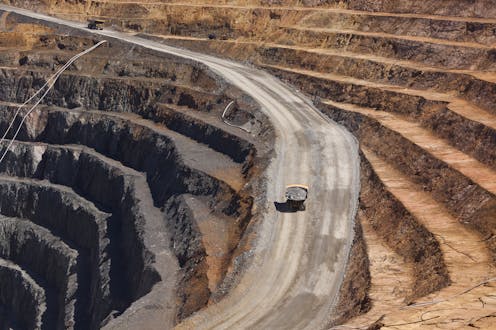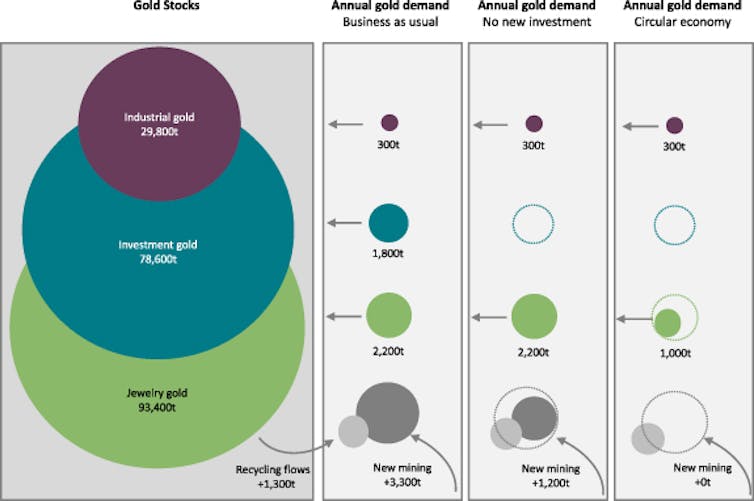
The 16th-century King Ferdinand of Spain sent his subjects abroad with the command: “Get gold, humanely if possible, but at all hazards, get gold.” His statement rings true today. Gold remains one of the world’s most expensive substances, but mining it is one of the most environmentally and socially destructive processes on the planet.
Around 7% of the gold purchased globally each year is used for industry, technology or medicine. The rest winds up in bank vaults and jewellery shops.
Beautiful objects and stable investments are worthwhile things to create and own, and often have significant cultural value. But neither can justify gold mining’s staggering human and ecological toll. In a recent study, my colleagues and I showed how it might be possible to end mining and instead rely entirely on recycled gold.
Despite improvements in gold mining practices over the past century and new regulations designed to limit mining’s impacts, this industry continues to wreak havoc upon landscapes across every continent except Antarctica.
In a given year, gold mines emit more greenhouse gases than all passenger flights between European nations combined. Gold mining also accounts for 38% of annual global mercury emissions, which cause millions of small-scale miners to suffer from chronic mercury poisoning, which can cause debilitating illness, especially in children.
Our research involved modelling hypothetical scenarios in which gold consumption could decline to more sustainable levels. Using current recycling rates, we examined a fully circular gold economy in which the world’s entire supply of gold came from recycled sources.
Even today, nearly one-quarter of annual gold demand is supplied through recycling, making it one of the world’s most recycled materials. The recycling process uses no mercury and has less than 1% of the water and carbon footprint of mined gold.
We found that a global decline in gold mining would not necessarily derail any of gold’s three central functions in jewellery, technology or as an investment.
Towards circularity

Our model showed that the gold used for industrial purposes (mainly in dentistry and smartphones) could be supplied for centuries even if all gold mining stopped tomorrow.
We also found that jewellery could still be produced with recycled gold in a fully circular gold industry. There would just be about 55% less to go around, which would still leave more than enough for essential uses.
In order to make this future a reality, investors would have to limit their trading to existing reserves, without adding newly mined gold to their coffers.
A world with a shrinking supply of gold would likely mean that consumers would pay more for the same 24-karat pure gold ring. But more likely, jewellery purchases would shift to cheaper (and more durable) alloys of gold that are already popular. And in the future, demand for gold may decline as consumers become more concerned with making sustainable choices.
The role that invested gold plays in the global economy would likely continue to function regardless of extraction. Like Renaissance art, gold is valuable precisely because it is scarce. Ending gold mining would not put an end to the buying and selling of gold for bank vaults. Instead, it would make existing stocks of gold more valuable.
Irrespective of whether the world needs gold, our research suggests that the world does not need gold mining.
Private investors and central banks may balk at this idea. The US government, for example, is the world’s single largest owner of gold, holding US$11 (9.1) billion in reserves. But transitions to sustainability are always hard-won and the gold industry is no exception.
Inspired by other transitions
Like gold, the extraction of fossil fuels is also environmentally damaging. But unlike gold, fossil fuels provide warmth and electricity to homes and businesses, power to vehicles and fertiliser to farms. Transitioning away from this resource required decades of research and investment into clean energy technologies.
By contrast, finding substitutes for gold does not require any research. Jewellery can be made more sustainable by blending gold with other metals. Investors can rely on existing gold stocks and diversify to other stable assets. And technology can continue to use recycled gold when appropriate.
Closing gold mines is the first step. But many regions have grown dependent on gold mining, and artisanal mining alone supports as many as 19 million miners and their families worldwide, mostly in developing economies.
These miners deserve a just transition that ensures they do not become collateral damage in the shift to sustainability. Governments must provide a robust safety net for former gold miners and their families. That includes offering low-cost training and reskilling to ensure that miners can find employment in more sustainable industries.
Steps toward sustainability
Responsibly drawing down gold extraction will take time. But several measures are available to begin the transition today.
On the demand side of the industry, major jewellery brands, including Pandora, have already committed to using only recycled gold by 2025. Global technology firm Apple has also recently set a goal to use exclusively recycled materials by 2030.
On the supply side, mining companies should begin retiring mines that extract only gold. Many copper mines produce gold as a byproduct, which will likely continue into the future.
Meanwhile, institutional investors should stop investing in new gold mines. That includes groups like the World Bank, which has invested US$800 (£660) million in gold mines in Africa, Asia, South America and the Pacific Islands since 2010.
Justice-minded fund managers, such as those overseeing endowments, should add gold mining firms alongside coal producers to their divestment lists. And central banks should redirect their future investments toward other stable stores of value, or at least source exclusively recycled gold.
The world is filled with difficult sustainability trade-offs. Gold mining is not one of them. Drawing down this industry stands out as a relatively easy way to reduce humanity’s footprint on a fragile planet.

Don’t have time to read about climate change as much as you’d like?
Get a weekly roundup in your inbox instead. Every Wednesday, The Conversation’s environment editor writes Imagine, a short email that goes a little deeper into just one climate issue. Join the 10,000+ readers who’ve subscribed so far.
Stephen Lezak is a Gates Scholar at the University of Cambridge Department of Geography and a researcher at the University of Oxford Smith School of Enterprise and the Environment.
This article was originally published on The Conversation. Read the original article.







